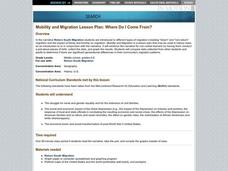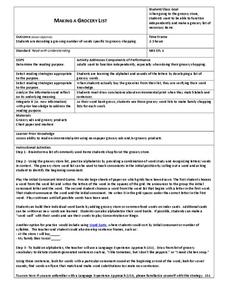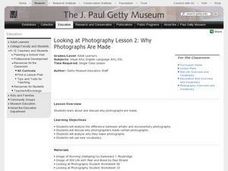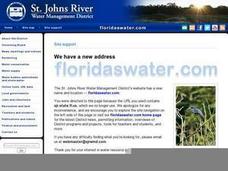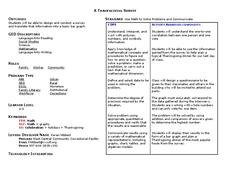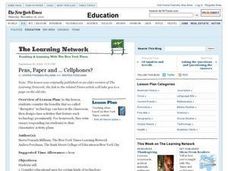Curated OER
Ecuadorian Rainforest: If the Forests Could Talk
Third graders explore the delicate balance the must be maintained in a rainforest ecosystem. In this ecosystems lesson, 3rd graders learn about the importance of "little things" such as bugs or a certain plant in the rainforest. This...
Curated OER
How Can We Keep Our Forests Intact and Have Our Chocolate Too?
Fourth graders explore various methods of growing and harvesting rainforest foods in order to sustain its biodiversity. They discuss the various uses for trees from several viewpoints. Students research chocolate demand and land use...
Curated OER
WHERE DO I COME FROM?
Learners analyze the struggle for racial and gender equality and for the extension of civil liberties, the social and economic impact of the Great Depression, and the economic boom and social transformation of post-World War II United...
Curated OER
Making a Grocery List
Pupils make a list and decode words that are related to grocery shopping. In this grocery shopping lesson plan, students discuss what you do at the grocery store.
Curated OER
Looking at Photography Lesson 2: Why Photographs Are Made
Students analyze the difference between artistic and documentary photography. They discuss why photographers made certain photographers.
Curated OER
Lesson 11 - Potable Water
Pupils investigate the meaning of potable water and water reuse. They define water quality and quantity problems. They complete worksheets, a quiz and design a poster.
Curated OER
The Long Road to Coffee
Students organize picture cards of the sequene of how food gets from a farm to their home. They then sequence cards of how coffee grown in Colombia gets to their home comparing the differences.
Curated OER
Building Bridges for Young Learners
Students compare and contrast families around the world emphasizing the country of India. In this families lesson plan, students share and learn about roles in families, how we share characteristics, and how families in India are similar...
Curated OER
Canoe and Kayak
Students explore canoes and kayaks. In this canoe and kayak activity, students research the history, parts, and sport of the canoe and kayak. Students then practice how to use a paddle for each boat, and go on a field trip in order...
Curated OER
A Thanksgiving Survey
Students conduct a survey. In this math lesson, students design and conduct a survey about Thanksgiving foods. Students display the collected data in a graph and use the graph to determine what food to serve for a Thanksgiving meal.
Curated OER
Is There A Fungus Among Us?
Sixth graders classify fungus into two different groups. In this fungus activity, 6th graders collect as many pieces of fungus as possible. Students then classify these pieces of fungus as saprophytic or parasitic.
Curated OER
Decision Making and Teen Parenthood
Students inspect psychology by completing a worksheet in class. In this sexual health activity, students discuss the responsibilities and maturity necessary in order to have a child and to also be sexually active. Students answer study...
Curated OER
Communication 3: Taking "No" For An Answer
Students play a rejection game and fill in sentences about taking and accepting "no" for an answer. In this taking "no" worksheet, students also discuss how asking more than twice is aggression.
Curated OER
What is Diabetes?
Students examine basic information about diabetes and related vocabulary words. They explore various health websites, complete a worksheet, discuss the worksheet answers and discuss diabetes myths vs. facts.
Curated OER
Describing Clothes
A lesson all about clothing and colors, this might be a useful lesson for English language learners or introducing descriptive writing. After a short review of colors and clothing vocabulary, learners answer questions regarding what...
Curated OER
Pens, Paper and ... Cellphones?
Learners consider the benefits that so-called disruptive technology can have in the classroom, then design class activities that feature such technology prominently. They write essays responding (as students) to their classmates'...
Baylor College
Food Webs
Explore various ecosystems from around the world as your class discovers the interdependence of all living things. Using the provided sets of ecosystem cards, young scientists work in small groups building food webs to demonstrate the...
Baylor College
What Is the Water Cycle?
Small groups place sand and ice in a covered box, place the box in the sunlight, then observe as evaporation, condensation, and precipitation occur. These models serve as miniature water cycles and demonstrations of the three phases of...
Baylor College
Can Nutrients in Water Cause Harm?
Ecology candidates culture pond water organisms over a few days time, then they experiment to find out how increasing nutrients affects the population. As part of a unit on water, this exploration gives your class an understanding of how...
Baylor College
What Is a One Part Per Million Solution?
Water may appear to be crystal clear, but there could be dissolved substances present. Lab groups make a one-part-per-million of a food coloring solution to demonstrate this concept. As part of an outstanding unit about water, this...
Baylor College
There's Something in the Air
Clever! In order to compare indoor and outdoor dispersal rates for the movement of gases and particles through air, collaborators will participate in a classroom experiment. Set up a circular grid and set students on lines that are...
Baylor College
Heart and Lungs
With a partner, youngsters measure their pulse and breathing rates, both at rest and after running in place for a minute. While this activity is not novel, the lesson plan includes a large-scale classroom graphing activity and other...
Baylor College
How Can We Find Out What Is in Water?
Using paper chromatography, water watchers discover that several substances might be dissolved even though they aren't visible. For this case, you will prepare a mixture of three different food colorings for them to experiment with. A...
Baylor College
People and Climate
Model how the sun's energy strikes the planet and help your class relate it to a climate map. Assign small groups an individual climate zone to discuss. They reflect on and research how humans survive in the assigned climate and write a...




